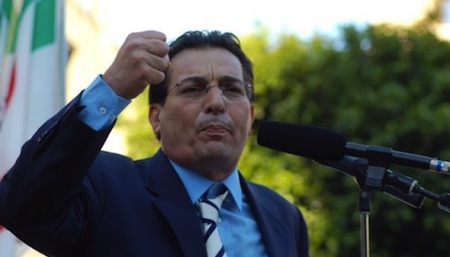I wasn’t entirely sure he could pull it off, but the unlikely Rosario Crocetta will become Sicily’s first openly-gay regional president and likely the first leftist to have won a clear mandate in one of Italy’s most culturally and politically conservative regions.![]()
![]()
According to preliminary results, the center-left coalition backing Crocetta has won 30.48% and 39 seats in Sicily’s 90-member regional parliament, giving it a plurality of seats, but something short of an absolute majority.
Crocetta’s victory in Sicily makes the former Gela mayor Italy’s second openly gay regional president — he joins leftist Nichi Vendola, the president of Puglia (also in southern Italy). This is a bit of a shocker given Sicily’s incredibly conservative bent, and the region has been consistently governed by center-right politicians and centrists alike, but never by a former Communist Party member.
Through the early 2000s, Crocetta was a member of the Partito della Rifondazione Comunista (Communist Refoundation Party). Although many PRC members joined moderate social democrats and centrists to form what’s now Italy’s largest center-left political party, the Partito Democratico (PD, Democratic Party), in 2007, Crocetta certainly comes from the more radical leftist tradition. Interestingly enough, so does Vendola, who was elected as Puglia’s regional president in 2005 from the PRC and subsequently reelected. Vendola, who has future national political hopes, and who seems likely to play a role in Italy’s upcoming national elections in early 2013, has formed his own leftist party — Sinistra Ecologia Libertà (SEL, Left Ecology Freedom).
Not only is Crocetta’s victory a watershed moment for Italy’s left, it’s a victory for Sicily’s courageous anti-mafia forces. In a region where politics and organized crime are often two sides of the same coin, Crocetta was an anti-mafia crusader as the former mayor of Gela, Sicily’s sixth-largest city, working to convince local businesses not to pay protection money to the Sicilian mafia. In fact, he was such a stridently anti-mafia mayor that he’s been the subject of several assassination plots and has been living outside of Gela since 2009.
Meanwhile, the center-right coalition led by European Parliament member Nello Musumeci has won just 25.73% and 21 seats.
The surprisingly strong third-place winner was the new anti-austerity protest party, the Movimento 5 Stelle (M5S, Five Star Movement), led nationally by the comedian and blogger Beppe Grillo — who swam across the Strait of Messina from the Italian peninsula to Sicily to kick off the party’s regional campaign. Giancarlo Cancelleri, the presidential candidate backed by the Five Star Movement, won 18.18% and the party won 15 seats.
A center-right ‘Sicilianist’ coalition, essentially the coalition to which outgoing president Rafaelle Lombardo belongs, under the candidacy of Gianfranco Micciché won just 15.50% and 15 seats. Lombardo resigned in July in the wake of charges of corruption and complicity with the Sicilian mafia, forcing early elections.
Although the Sicilian autonomist and center-right parties have governed together before, they won’t together command a majority of seats in Sicily’s regional parliament, meaning that the center-left will govern with a minority, likely with the outside support of Five Star Movement legislators, or even from the Sicilianist autonomists.
When you look at the direct party ballot (separate from the vote for regional president), the Five Star Movement won the highest number of votes with 14.89%, to just 13.43% for Crocetta’s PD, just 12.91% for the center-right Popolo della Libertà (PdL, People of Freedom), the party of former prime minister Silvio Berlusconi and his protege, former justice minister Angelino Alfano (who is also Sicilian), just 10.85% for the Unione di Centro (UdC, Union of the Center), the former Christian Democrats, and 9.54% for the autonomous Partito die Siciliani (PdS, Party of the Sicilians). Obviously, it goes without saying that the vote was highly fragmented, a trend that seems likely to follow in 2013’s national elections. Both the center-left and center-right are currently supporting the technocratic government of prime minister Mario Monti, who’s carried out several budget, labor and tax reforms since taking office in November 2011, with Italian debt yields priced at near-crisis highs, but elections are due before April 2013 in what promises to be a very unpredictable campaign.
There’s some bad news for everyone in the results, which saw a depressed turnout of just 47% — in contrast, almost 68% of eligible Sicilians participated in the previous 2008 election.
Berlusconi and Alfano will have seen the PdL’s support drop by nearly 20% since the 2008 regional election. That’s not exactly the boost Alfano needs before trying to become the center-right’s main prime minister candidate in advance of 2013 elections. Berlusconi, of course, is busy with his own difficulties following last Friday’s conviction for tax fraud. It’s been a rough month, otherwise, for Italy’s center-right.
Renata Polverini, the PdL-backed regional president of Lazio, Italy’s third-most populous region and home to the capital, Rome, stepped down September 24 after being implicated in a corruption scandal. Lombardy, Italy’s most populous — and wealthiest — region and home to cultural center Milan, will also have early elections after the resignation of its longtime regional president Roberto Formigoni on October 16 after being accused of buying votes from the Calabrian mafia. Formigoni, who’s headed Lombardy’s government since 1995, has long been a staunch ally of Berlusconi.
Despite Crocetta’s historic win, the PD won’t be heartened by its anemic result either, which is also less than its 2008 result.
Grillo’s Five Star Movement will be heartened by the result, of course, but it remains to be seen whether Italians will take it any more seriously than a protest vote.
Sicily is Italy’s fourth-most populous region with over 5 million people, but among the poorest — its GDP per capita is nearly one-half of that of Lombardy in north-central Italy, and its government is sinking under debt incurred by Lombardo’s previous administration.

3 thoughts on “Crocetta to become Sicily’s first openly-gay, first leftist president”